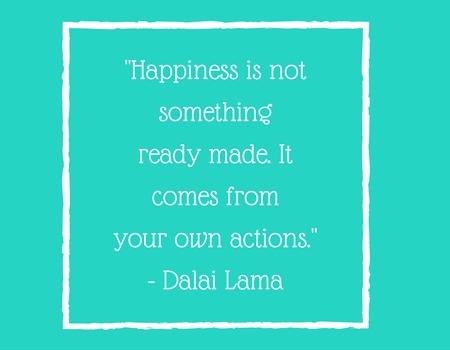For some of us (arguably, a lot of us), happiness hasn't come naturally. Whether we've struggled with depression, addiction issues or a lifelong bout of low-grade melancholia, daily life may feel more like a ride on the Titanic than a pleasure cruise.
But that's okay. Some roads are rockier than others -- some journeys, longer. But even if it doesn't come easily, happiness is worth the struggle. It's worth striving, working, fighting to feel better.
The truth is, for many people, happiness is a choice. And as with anything worthwhile, it starts with habits. That may not sound sexy (no instant gratification involved) but it works. Living a joyful life is always a possibility, but it's a matter of choice, consistency and change.
 So to help you on the road to a brighter life, here are 10 happy habits that, when implemented, can make a major difference in your mood.
So to help you on the road to a brighter life, here are 10 happy habits that, when implemented, can make a major difference in your mood.
(Note: If you suffer from depression, never be afraid to ask for help. You don't have to do it alone, and getting better may require professional help.)
10. Be mindful.
Live your moments. The now is all that matters, and it's all you're guaranteed. In the words of Eckhart Tolle, "Realize deeply that the present moment is all you have. Make the NOW the primary focus of your life." Pay attention to where you are, what's happening,
9. Laugh.
Laughter is the best medicine. Seriously -- science says so. Studies suggest humor can lower cortisol, protect against heart disease and even assist with memory recall. So laugh it up, every chance you get.
8. Be outside as often as possible.
Human beings weren't meant to stay glued to a computer, living life in the AC under artificial lights. Mother Nature is our life partner, and neglecting her is a major mistake. Nature even boosts brain function, and the out-of-doors can work wonders on a miserable mood. The indoors, not so much. Vitamin D is a must.
7. Exercise.
A Harvard study showed that exercise can be as effective as antidepressants for mild to moderate depression, and its effects can potentially last longer. It also works wonders for reducing stress, boosting confidence, controlling addiction and more. It's a miracle drug that isn't a drug.
6. Become part of a community.
Forming supportive relationships with others is an integral part of happiness (note: Facebook friends don't count). In a world where we're increasingly disconnected, finding a community is more challenging than it used to be, but it's not impossible. You can find a supportive circle that revolves around geography, sports, philanthropy -- there are endless possibilities and millions of other people looking for exactly the same thing.
5. Cultivate self-compassion.
Self-compassion can cure a wealth of ills. Sadly, most of us are programmed for exactly the opposite. We tear ourselves down, day in, day out. Self compassion pioneer Kristin Neff told the New York Times that most people believe self-criticism keeps them in line, but the truth is, "Self-compassion is really conducive to motivation." So be kind to yourself. Treat yourself as you'd treat a loved one. Adopt a nonjudgmental attitude. And with self-compassion comes compassion for all others as well.
4. Get spiritual.
A sense of connection to something greater than yourself can give your life meaning and purpose. One 2009 study suggested that spirituality is key to children's happiness, stating, "Children's spirituality, but not their religious practices (e.g., attending church, praying, and meditating), was strongly linked to their happiness. Children who were more spiritual were happier." This doesn't have to mean organized religion -- spirituality comes in many forms.
3. Meditate.
Meditation offers a lengthy list of benefits for body and mind, from relieving anxiety and depression to boosting immune response and sparking creativity. And it doesn't require a lengthy time commitment or escape to an ashram. Five minutes a day can do it.
2. Practice appreciation.
Much like exercise and meditation, gratitude has been linked to a whole host of health benefits, and can quickly change the way you feel about your life. So how do you start getting grateful? A gratitude journal. Write it in every day, and soon, you'll find things worth appreciating everywhere you look.
1. Rewire your mind.
Changing your distorted, negative thought patterns is one of the most important paths to long-term happiness. Generally a component of Cognitive Behavioral Therapy (CBT), learning to identify your cognitive distortions, then choosing better, more realistic thoughts, helps re-train your brain. Challenging the validity of the way you think (probably, the way you've always thought) is a crucial piece of the happiness puzzle. Because you're not stupid or worthless or unlovable, no matter what your brain might say.
Need help with a mental health issues? In the U.S., call 800-662-HELP (4357) for the SAMHSA National Helpline.